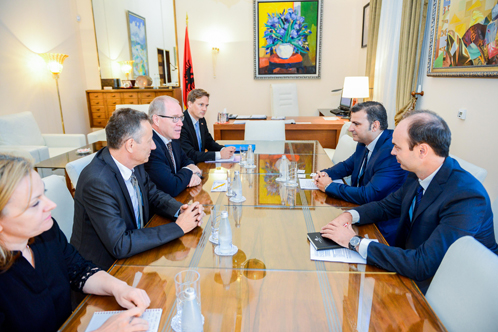BANK OF ALBANIA
PRESS RELEASE
Governor Sejko meets with SECO’s Director of Economic Cooperation and Development
Publication date: 14.09.2017
On 14 September 2017, the Governor of the Bank of Albania, Mr Gent Sejko, received at the premises of the Bank of Albania, the Director of Economic Co-operation and Development Division at the Swiss State Secretariat of Economic Affairs (SECO), Ambassador Raymund Furrer. The meeting was attended by the H.E. Ambassador of Switzerland in Albania, Mr Christoph Graf, as well as other senior representatives from the respective institutions.
Governor Sejko thanked the Swiss Government for the support and the fruitful cooperation, and expressed his appreciation regarding the projects and activities organized in the framework of this cooperation.

He highlighted that thanks to this cooperation, the Bank of Albania has received assistance in both research and decision-making processes, by developing analysis and forecasting models, through the implementation of new models and the improvement of policy making. More specifically, since 2013, over 20 training activities have been organized, attended by around 290 employees of the Bank of Albania. Governor Sejko also highlighted that the increase of technical and professional capacities of the Bank of Albania fosters the reliability and supports the further strengthening of the activity of the Bank of Albania.
Also, Governor Sejko presented an overview of the Albanian economic and financial situation, as well as of the work and results of the Bank of Albania. He pointed out to the resilience of the Albanian economy and financial system against crises and the contribution of the Bank of Albania in relation to it, through its accommodative monetary policy stance and the prudential supervision and regulation of the banking system. Governor Sejko stressed the positive trend of development in Albania, as well as the importance of reforms to improve the country's development model, improve the business environment and lending climate, as well as to move forward in the integration process and boost foreign investments. In particular, the Governor underlined that it is time now for the Albanian diaspora to be considered not only as merely a source of remittances, but also as a source of financial capital, of power and of managerial expertise.
The representatives of SECO thanked the Bank of Albania for its support through active participation and organization of joint activities and considered their program with the Bank of Albania as one of their best and most successful programmes.
Moreover, Ambassador Raymund Furrer informed that the Swiss parliament has approved the fund for the continuation of the central bank support programme and that Albania will continue to be part of SECO's programme. Under this programme, support for the Bank of Albania will continue in the upcoming years, through several initiatives and activities on key technical cooperation projects. Ambassador Furrer said that the continuation of joint development projects was based on and encouraged by the positive results achieved by the current programme and high absorption capacities that the Bank of Albania has shown.
Bilateral discussions continued with regard to future cooperation and opportunities for developing new projects in areas of particular importance to the Bank of Albania.
_________
* The State Secretariat for Economic Affairs is the centre of expertise of the Swiss Federal Government, which examines all the main issues related to economic policies. Its purpose is to ensure sustained economic growth, enabling the necessary conditions for regulatory and economic policies. Since 1992, SECO has been supporting central banks in partner countries, based on increasing demands for technical assistance in the field of central banking, through a strategic co-operation with the Graduate Institute of International Development Studies. Collaboration with some central banks generally consists of general advisory services and specific activities adjusted for the country, in the form of Technical Assistance and Training Programmes (TATPs).

 Twitter
Twitter
 Youtube
Youtube
 Facebook
Facebook
 Flickr
Flickr
 RSS
RSS
 Subscribe
Subscribe
 Feedback
Feedback